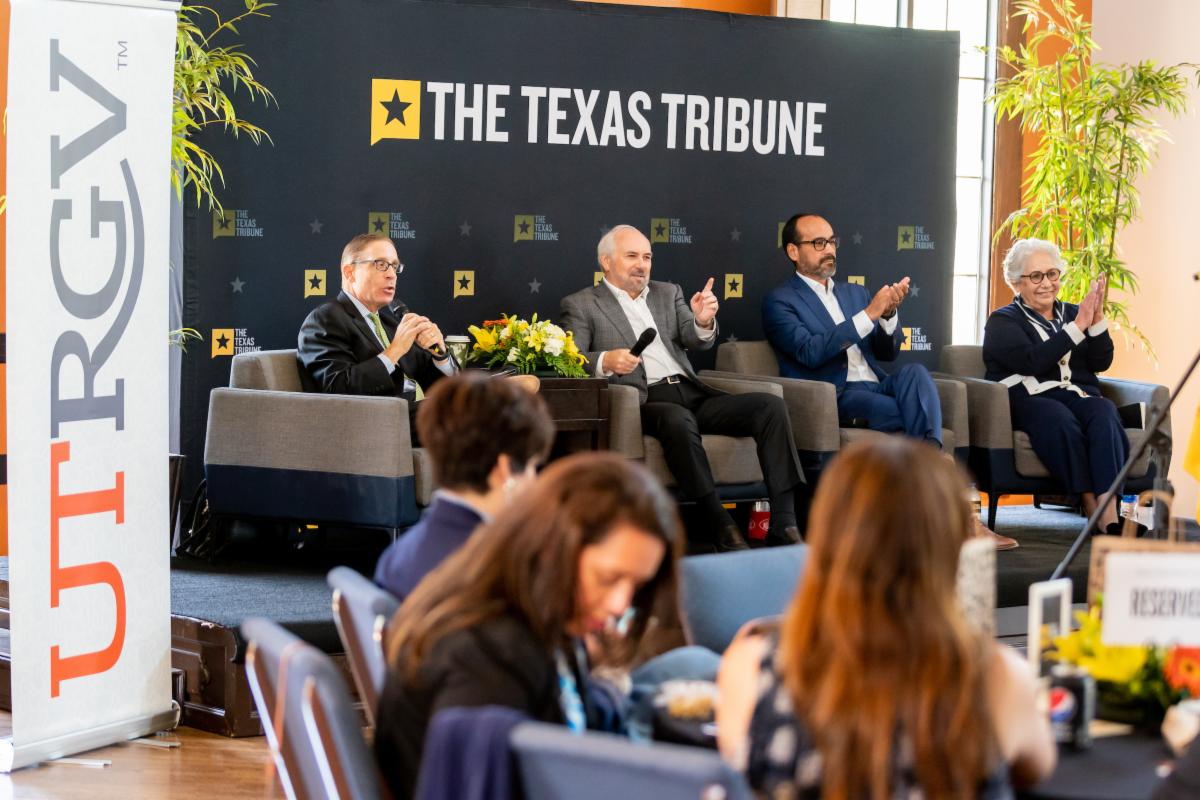UTRGV, Texas Tribune Panelists Discuss Challenges In Higher Education For Hispanics

Photo above, pictured from left are Evan Smith, chief executive officer of Texas Tribune; Dr. Guy Bailey, UTRGV president; Jacob Fraire, director of policy and strategy at the Diana Natalicio Institute for Hispanic Student Success at UT El Paso; and Dr. Juliet V. Garcia, former president of UT Brownsville and a recent recipient of the Presidential Medal of Freedom. (UTRGV Photo by David Pike)
By Victoria Brito Morales
RIO GRANDE VALLEY, TEXAS – AUG. 23, 2022 – UTRGV and the Texas Tribune came together Tuesday to create an open dialogue focused on diversity and student success in Texas.
The panel, titled “Serving Hispanic Students in Texas,” was held at the PlainsCapital Bank El Gran Salón on the UTRGV Brownsville Campus.
Three distinguished educators on the panel spoke to critical questions about the measures needed to ensure the success of Hispanic students, and to offer insight into what administrators and educators need to bridge the gaps.
The panelists were:
UTRGV President Guy Bailey.
Jacob Fraire, director of policy and strategy at the Diana Natalicio Institute for Hispanic Student Success at UT El Paso.
And Dr. Juliet V. Garcia, former president of UT Brownsville, UTRGV professor of Communication, and a recent recipient of the Presidential Medal of Freedom presented by President Joe Biden.
The event was moderated by Evan Smith, chief executive officer of Texas Tribune.
HIGHER EDUCATION IN THE STATE: WHERE THE RIO GRANDE VALLEY STANDS
In Texas, the average of Hispanic completion of higher education is only 17 percent, but in the Rio Grande Valley, that figure climbs to 23 percent.
UTRGV has worked meticulously to change the narrative by providing quality and affordable education opportunities to those who want to pursue higher education, Bailey said.
“Our public school graduation rates (in the Valley) are going up, and that is not true in the rest of the state,” Bailey said.
In addition, the four- to six-year graduation rate of UTRGV students is increasing significantly, as well, to almost equal the national average – and Bailey credits the Valley’s value system for that sort of success at UTRGV.
“We have people who value higher education, our communities and our students, and they have been terrific to work with,” he said. “We’ve tried to create a financial model of an institution that helps them graduate with minimal debt.”
LOOKING TO THE FUTURE OF TEXAS
As the discussion came to a close, Smith asked each panelist for their “one wish” from the Texas Legislature, which goes back into session in January and now has a higher education subcommittee. The wish should be to advance the cause of serving Hispanic students in Texas, Smith said.
Bailey said fund the formula fully.
“If we had the funding formula fully funded, that would help us enormously,” he said.
Fraire said the state Legislature should give careful consideration to a full 30 years of data and evidence on the efficacy of Hispanic Serving Institutions (HSIs).
“I would invite our policymakers at the state Capitol to learn from that experiment, learn from how they are having success – and in the kinds of outcomes that we talked about earlier – and think about whether or not there is an opportunity in Texas to also have HSIs as a catalyst for success for Hispanic students across our great state,” Fraire said.
Garcia, who sits on the Texas 2036 Board of Directors, echoed Fraire’s call for a data-driven approach by Texas policymakers.
“Listen to the data, because 2036 is data driven and its policies are being suggested and prepared for the Legislature, so there are many recommendations,” Garcia said. “Let data drive your decisions, not the latest rumor about something. Use that data.”
To view the entire panel discussion, texastribune.org/2022/08/08/serving-hispanic-students-in-texas/

